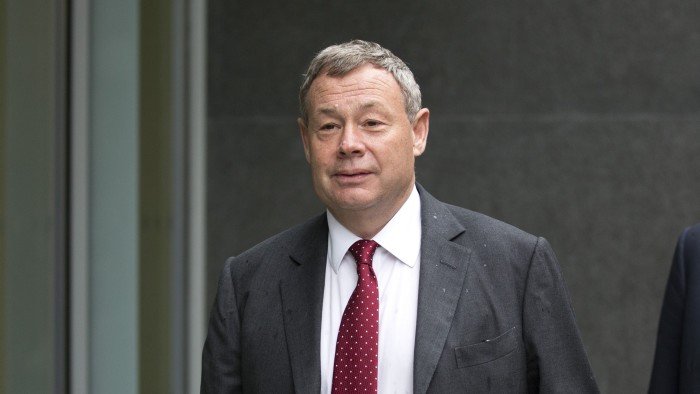Unlock the Editor’s Digest for free
Roula Khalaf, Editor of the FT, selects her favourite stories in this weekly newsletter.
Simon Gleeson will have known that the High Court clash of heavyweight investment bankers that he ruled on this week could well make his name as a judge. His legal reputation was already solid after many years at Clifford Chance in London as a financial industry specialist before becoming a High Court judge in 2021. But this was different, both in the precedent the case sets and the profile of those involved.
The case in front of him concerned three individuals in particular: Ian Hannam, a former special forces soldier who essentially helped refashion the FTSE 100 in his time at JPMorgan Cazenove; John Thornton, the former president at Goldman Sachs; and Michael Klein, an ex-Citigroup banker, now running his own firm in New York.
To say this promised to be a courtroom version of three prize investment banking rats, fighting in a sack, would be uncouth. These men are accomplished professionals. But then the world of corporate finance is a brutally competitive business, and these guys have been at the sharp end of it for three decades or more.
For Gleeson, the future prospect of honourables and learned friends citing his judgment in H&P Advisory v Barrick Gold must have loomed. And so yes, he’ll have taken time in crafting the 130-page High Court judgment that was published this week. The result is a fascinating, warts-and-all account of a £6bn 2019 deal, where Barrick Gold of Canada merged with UK-listed Randgold.
The central legal claim? A quaint concept known as “unjust enrichment”. This is a common law course of action, often over rather pedestrian matters, like misdirected bank payments. Here, in rough terms, the case involved whether Hannan at H&P Advisory should be paid for work it had done on the deal. After a tonne of financial analysis on both corporate entities and bringing the executive parties together, the company expected to be mandated as one of the core advisers on the merger. Instead, the claimant alleged, Barrick’s executive chair, Thornton, had channelled the fees to his long-standing friend and adviser Klein.
As Gleeson noted: “There is a 19th-century feel to this action. There is no documentary record of the negotiations between the parties or of the agreement which is alleged to have been reached . . . Consequently there is a straightforward conflict of evidence between two individuals as to what passed between them at a particular moment, and whether those words gave rise to an oral contract or some other form of commitment.”
Old-fashioned perhaps, but that’s how investment banking continues to be run. Hannam et al are not billing-by-the-hour advisers. All big companies are flooded with barely solicited analysis and advice on strategy. This work is often provided for free in the expectation that if the company acts on the advice, the bankers will be paid.
Hannam believed he had offered unique insight into the threats facing Barrick, found a solution in a merger with Randgold and facilitated the required introductions at an executive level; Thornton and team argued they knew all this already and never really needed Hannam’s help.
One challenge for the judge here was to determine “whether an objective observer would have concluded that an offer (of paid-for advice) had been made and unequivocally accepted . . . regardless of the state of mind of the parties”. Gleeson decided not, which threw up the question as to whether Thornton and Co had enjoyed “unjust enrichment” — benefiting from Hannam’s advice and contacts for free — or that Hannam was simply a “disappointed risk taker.”
Gleeson, in the main, sided with Hannam. The H&P banker believed he had in effect been appointed; the Thornton camp, meanwhile, failed to disabuse him of that. But the value of Hannam’s work was put at $2mn, rather than the $10mn he first demanded and the subsequent $18mn legal claim.
The case will cause corporate executives to pause in their interactions with investment bankers. The lack of a written contract does not preclude a bill for advice, and the concept of My Word is My Bond still holds, in this industry at least.
But here’s the extract that Gleeson will now surely be remembered for, and it deserves to be cited at length: “ . . . In the main, investment bankers, like teenage lovers, pour out their efforts, almost without limit and in response to the slightest encouragement, in the hope of reaching the nirvana of a mandate . . .
“ . . . It is clearly the case that any sensible investment banker will after a while decide that a particular mandate is no longer worth pursuing, on the principle of not throwing good money after bad. However, until that point is reached, as [Alexander] Pope wrote in his ‘Essay on Man’, hope springs eternal in the human breast.”
paul.murphy@ft.com
.
